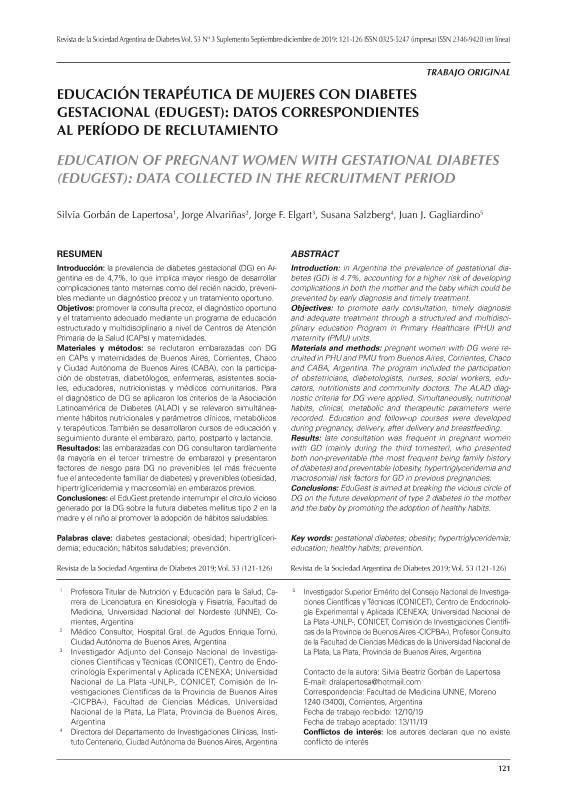Artículo
Introducción: la prevalencia de diabetes gestacional (DG) en Argentina es de 4,7%, lo que implica mayor riesgo de desarrollar complicaciones tanto maternas como del recién nacido, prevenibles mediante un diagnóstico precoz y un tratamiento oportuno. Objetivos: promover la consulta precoz, el diagnóstico oportuno y el tratamiento adecuado mediante un programa de educación estructurado y multidisciplinario a nivel de Centros de Atención Primaria de la Salud (CAPs) y maternidades. Materiales y métodos: se reclutaron embarazadas con DG en CAPs y maternidades de Buenos Aires, Corrientes, Chaco y Ciudad Autónoma de Buenos Aires (CABA), con la participación de obstetras, diabetólogos, enfermeras, asistentes sociales, educadores, nutricionistas y médicos comunitarios. Para el diagnóstico de DG se aplicaron los criterios de la Asociación Latinoamérica de Diabetes (ALAD) y se relevaron simultáneamente hábitos nutricionales y parámetros clínicos, metabólicos y terapéuticos. También se desarrollaron cursos de educación y seguimiento durante el embarazo, parto, postparto y lactancia. Resultados: las embarazadas con DG consultaron tardíamente (la mayoría en el tercer trimestre de embarazo) y presentaron factores de riesgo para DG no prevenibles (el más frecuente fue el antecedente familiar de diabetes) y prevenibles (obesidad, hipertrigliceridemia y macrosomía) en embarazos previos. Conclusiones: el EduGest pretende interrumpir el círculo vicioso generado por la DG sobre la futura diabetes mellitus tipo 2 en la madre y el niño al promover la adopción de hábitos saludables. Introduction: in Argentina the prevalence of gestational diabetes (GD) is 4.7%, accounting for a higher risk of developing complications in both the mother and the baby which could be prevented by early diagnosis and timely treatment. Objectives: to promote early consultation, timely diagnosis and adequate treatment through a structured and multidisciplinary education Program in Primary Healthcare (PHU) and maternity (PMU) units. Materials and methods: pregnant women with DG were recruited in PHU and PMU from Buenos Aires, Corrientes, Chaco and CABA, Argentina. The program included the participation of obstetricians, diabetologists, nurses, social workers, educators, nutritionists and community doctors. The ALAD diagnostic criteria for DG were applied. Simultaneously, nutritional habits, clinical, metabolic and therapeutic parameters were recorded. Education and follow-up courses were developed during pregnancy, delivery, after delivery and breastfeeding. Results: late consultation was frequent in pregnant women with GD (mainly during the third trimester), who presented both non-preventable (the most frequent being family history of diabetes) and preventable (obesity, hypertriglyceridemia and macrosomia) risk factors for GD in previous pregnancies. Conclusions: EduGest is aimed at breaking the vicious circle of DG on the future development of type 2 diabetes in the mother and the baby by promoting the adoption of healthy habits.
Educación terapéutica de mujeres con diabetes gestacional (EDUGEST): datos correspondientes al período de reclutamiento
Título:
Education of pregnant women with gestational diabetes (EDUGEST): data collected in the recruitment period
Gorban de Lapertosa, Silvia Beatriz; Alvariñas, Jorge; Elgart, Jorge Federico ; Salzberg, Susana; Gagliardino, Juan Jose
; Salzberg, Susana; Gagliardino, Juan Jose
 ; Salzberg, Susana; Gagliardino, Juan Jose
; Salzberg, Susana; Gagliardino, Juan Jose
Fecha de publicación:
09/2019
Editorial:
Lugones
Revista:
Revista de la Sociedad Argentina de Diabetes
ISSN:
2346-9420
e-ISSN:
0325-5247
Idioma:
Español
Tipo de recurso:
Artículo publicado
Clasificación temática:
Resumen
Palabras clave:
Educación
,
Diabetes gestacional
,
Calidad de atención
Archivos asociados
Licencia
Identificadores
Colecciones
Articulos(CENEXA)
Articulos de CENTRO DE ENDOCRINOLOGIA EXP.Y APLICADA (I)
Articulos de CENTRO DE ENDOCRINOLOGIA EXP.Y APLICADA (I)
Citación
Gorban de Lapertosa, Silvia Beatriz; Alvariñas, Jorge; Elgart, Jorge Federico; Salzberg, Susana; Gagliardino, Juan Jose; Educación terapéutica de mujeres con diabetes gestacional (EDUGEST): datos correspondientes al período de reclutamiento; Lugones; Revista de la Sociedad Argentina de Diabetes; 53; 3Sup; 9-2019; 121-126
Compartir
Altmétricas



